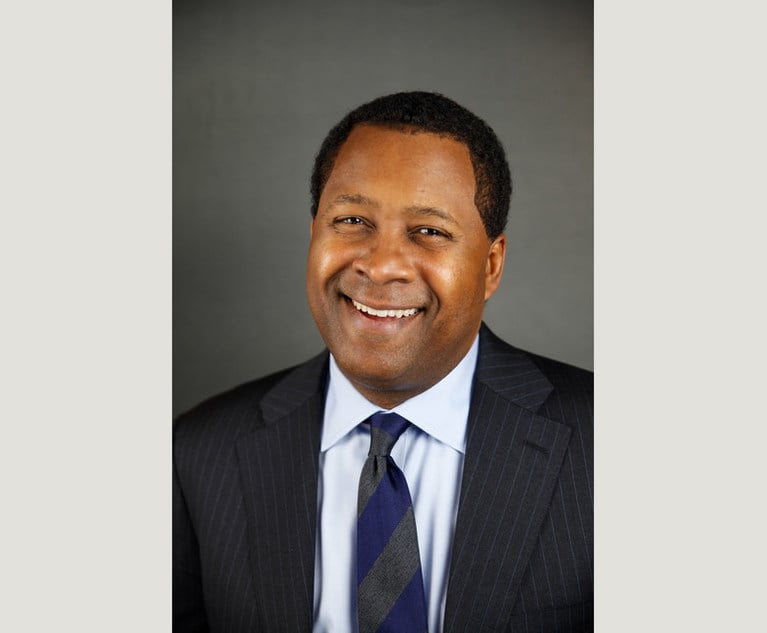Compliance Hot Spots: DOJ's Looking at Litigation Finance in Qui Tam Cases | CFPB's New 'Abusive' Standard | Lobbying Revenue Soars | Who Got the Work
Welcome to Compliance Hot Spots, our Law.com briefing on white-collar trends, regulatory and compliance. DOJ's got its eye on litigating finance in False Claims cases; CFPB proposes a new "abusiveness" standard. Scroll down for Who Got the Work, including Wells Fargo hiring a Munger Tolles team for a new SCOTUS case. Thanks for reading!
January 28, 2020 at 09:00 PM
13 minute read
Welcome to Compliance Hot Spots, our Law.com briefing on white-collar enforcement, regulatory and compliance. A leading DOJ lawyer reveals concern about litigation-finance arrangements. The CFPB's proposing a new standard for "abusiveness." Plus, Preet Bharara's task force is out with its insider-trading proposal. Scroll down for Who Got the Work, headlines, moves and more.
Tips, feedback and general thoughts on your practices are always appreciated. Contact C. Ryan Barber in Washington at [email protected] and 202-828-0315. Follow him on Twitter @cryanbarber. Contact Mike Scarcella at [email protected] and follow him on Twitter @Mikescarcella. Thanks for reading! 
DOJ Eyes Litigation Funding in FCA Cases
A senior U.S. Justice Department lawyer said Monday the agency is evaluating proposals that could open up third-party litigation finance arrangements to greater public scrutiny and oversight.
"Aside from what the litigation finance industry says publicly, we have little insight into the extent to which they are backing the qui tam cases we are investigating, litigating or monitoring," Stephen Cox, a deputy associate attorney general, said in remarks at the 2020 Advanced Forum on False Claims and Qui Tam Enforcement in New York.
Cox noted proposals "being considered within the Civil Rules Advisory Committee's MDL Subcommittee and another is a bill sponsored by Senator Grassley and other members of the Judiciary Committee in the Senate."
"Those proposals focus on third-party litigation finance disclosure in civil litigation at large, especially with respect to multidistrict litigation and class action litigation, and my understanding is that the proponents believe disclosure is appropriate for a number of reasons including potential conflicts of interests, concerns about distortion in civil justice, fairness in litigation, and transparency and accountability," he said.
Cox said the Justice Department is looking at the proposals "in the broader context, but we are particularly focused on the role that litigation funding plays in qui tam litigation." He told the audience that "we have dealt with some qui tam litigation where there were investors funding the relator entity, and with a relator accused by his employer of attempting to profit from qui tam litigation through short selling stock."
"We are considering what, if any, interests the United States has with respect to third-party litigation financing in qui tam litigation and whether it is worth seeking some disclosure, at least to the department, of such arrangements," he said. 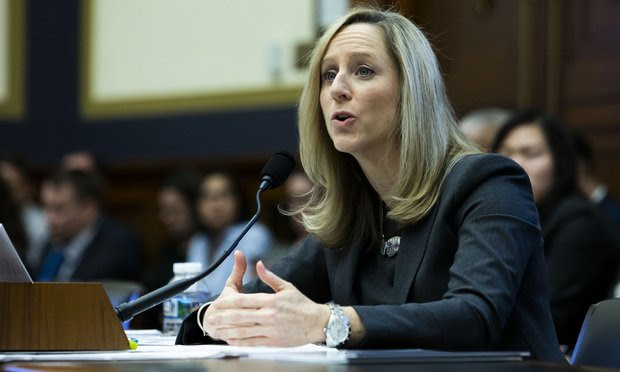
CFPB's New 'Abusive' Standard: Takeaways
In its early years, the Consumer Financial Protection Bureau drew consternation for an enforcement approach that was viewed by the industry as overly aggressive and lacking clarity. Critics of the CFPB's Obama-appointed leadership argued the agency was using enforcement actions with multimillion-dollar penalties to establish ground rules for regulated markets.
Those critics dubbed the approach "regulation-by-enforcement." The agency's Trump-appointed leadership is now vowing to change course.
When the CFPB came out with a new policy for policing practices it deems "abusive," some observers were struck by the bureau's plan to more clearly define that term to the industry. The CFPB said it would seek to allege "stand alone" abusiveness violations and avoid "dual pleading," or labeling conduct also as unfair or abusive under its authority to crack down on "unfair, deceptive or abusive acts or practices."
"I am committed to ensuring we have clear rules of the road and fostering a culture of compliance—a key element in preventing consumer harm," CFPB Director Kathleen Kraninger said in a statement. "We've developed a policy that provides a solid framework to prevent consumer harm while promoting the clarity needed to foster consumer beneficial products as well as compliance in the marketplace, now and in the future."
The message, to some observers, sounded a lot like regulation-by-enforcement, urging the industry to wait-and-see how "abusive" would be defined. And it came, at least for now, in the place of the formal rulemaking, although the CFPB stressed it was leaving open the possibility of setting firmer regulations defining the abusiveness standard.
"I have to say, there's a little bit of irony there," said Davis Wright Tremaine partner Jonathan Engel, a former CFPB enforcement attorney. "This administration has decried the 'regulation-by-litigation.'"
"They characterized the Cordray administration as doing effectively what they're doing here," he added, referring to Richard Cordray, who served as the CFPB director under the Obama presidency.
Jeff Sovern over at Public Citizen's Consumer Law and Policy Blog called the CFPB's new abusiveness policy "disappointing." He added: "It is intended to address a problem that has never been shown to exist."
>> More reading here at Bloomberg Law, and here at Reuters. 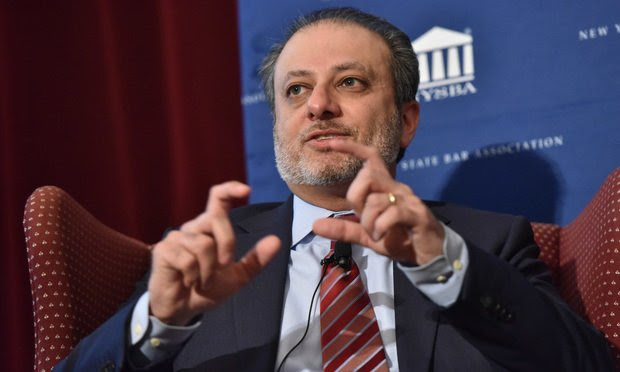
Bharara Task Force's Insider-Trading Pitch
Former Manhattan U.S. attorney Preet Bharara and his task force comprising white-collar perspectives from Big Law, academia and the courts has proposed a series of reforms that they contend would clear up and strengthen insider-trading laws. "Our nation's insider trading laws have for too long lacked clarity, generated confusion, and failed to keep up with the times," Bharara said in a statement, announcing the new report. "This lack of clarity and certainty, in this important area of law and our securities markets, has benefited no one."
Among the proposals introduced in the report: The "personal benefit" requirement in prosecutions should be eliminated. Read the full report here.
From a Financial Times report: "The task force's recommendations aligned in parts with the seven-page bill passed last year by the House, which largely codified existing practice while expanding the law to cover insider trading that involves hacking. However, the group called for a clearer distinction between the standards for civil and criminal cases and pushed for the elimination of the personal benefit test."
Bharara led the task force, whose other members were Joon Kim, partner at Cleary Gottlieb Steen & Hamilton; Joan McKown, partner at Jones Day; Senior U.S. District Judge Jed Rakoff; Melinda Haag, partner at Orrick, Herrington & Sutcliffe; Joseph Grundfest, professor at Stanford Law School; Katherine Goldstein, partner at Milbank; and John Coffee Jr., professor at Columbia Law School. 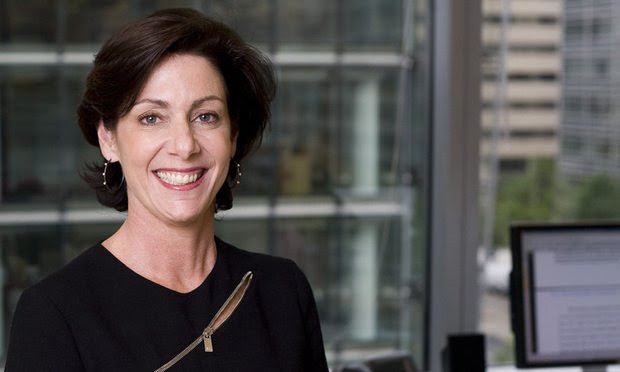
Who Got the Work
>> Beth Wilkinson (above) of Wilkinson Walsh represented former pharma executive John N. Kapoor, sentenced last week to 5 ½ years in prison on a criminal conspiracy case. The Wall Street Journal said Kapoor's sentencing "caps the fall of a former pharmaceutical industry highflier, along with the company he founded and several fellow executives. Insys's market value reached a high of $3.2 billion in 2015 thanks to the sales from its fentanyl drug Subsys. On Thursday, the company's value stood at $3.87 million, a decline of 99.9%."
 >> Wells Fargo has hired a team from Munger, Tolles & Olson to file a petition at the U.S. Supreme Court challenging a False Claims Act (FCA) ruling from the Second Circuit. "The Second Circuit's decision involves issues of major national importance in the administration of the FCA. The decision has potentially sweeping implications for the treatment not only of the banks but also of various other government instrumentalities," Donald Verrilli Jr. told the court this week. The Munger Tolles team also includes Elaine Goldenberg (at left) and Ginger Anders in Washington and Blanca Young in San Francisco. Wells Fargo has a separate petition in a Fair Housing Act dispute at the Supreme Court; in that case, Hogan Lovells partner Neal Katyal is counsel of record. A team from K&L Gates also represents Wells Fargo on that petition.
>> Wells Fargo has hired a team from Munger, Tolles & Olson to file a petition at the U.S. Supreme Court challenging a False Claims Act (FCA) ruling from the Second Circuit. "The Second Circuit's decision involves issues of major national importance in the administration of the FCA. The decision has potentially sweeping implications for the treatment not only of the banks but also of various other government instrumentalities," Donald Verrilli Jr. told the court this week. The Munger Tolles team also includes Elaine Goldenberg (at left) and Ginger Anders in Washington and Blanca Young in San Francisco. Wells Fargo has a separate petition in a Fair Housing Act dispute at the Supreme Court; in that case, Hogan Lovells partner Neal Katyal is counsel of record. A team from K&L Gates also represents Wells Fargo on that petition.
>> Phillips & Cohen partner Erika Kelton represented the whistleblower who received a more than $277,000 award from the Securities and Exchange Commission for helping with an unspecified enforcement action. In setting the award, the commission considered the "low collections to date" as a factor favoring a larger portion of the sanctions. The SEC's whistleblower rules allow for tipsters to receive a bounty of between 10 and 30 percent of penalties collected as part of an enforcement action. Kelton previously represented a whistleblower who received more than $32 million, at the time a record-setting bounty. 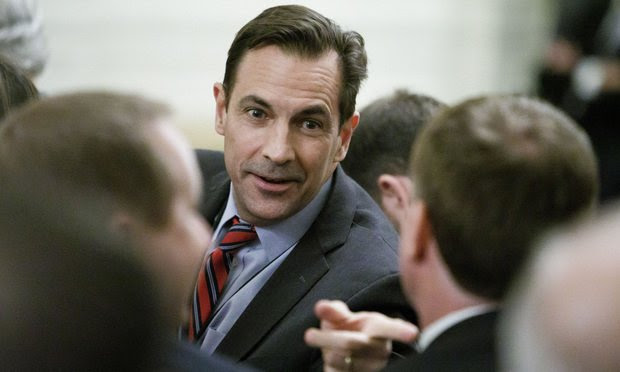
Compliance Reading Corner: Stories That Caught Our Eye
Trump administration
Hard-Charging White House Budget Lawyer in Middle of Ukraine Decision Has Pushed Legal Limits for Trump. Meet Mark Paoletta (above), general counsel to the White House Office of Management and Budget. "Paoletta's below-the-radar role in a decision key to Trump's impeachment is just one example of how he has enabled the White House to stretch the legal limits of the executive branch—forcefully pushing forward the administration's agenda but sometimes incurring a severe backlash in the process." [The Washington Post]
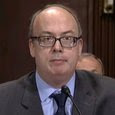 Senior DOJ Political Appointee Apologizes to Court After Bar License Lapsed. The lawyer, Jeffrey B. Clark (at left), head of DOJ's environment team and a former Kirkland & Ellis partner, has apologized to courts for letting his D.C. bar license lapse. "I was not aware of the lapse due to nonpayment of dues and did not intend to mislead the court," Clark said in a notice to the court. Clark also advised: "The D.C. Bar did not have my correct address and I received no mail forwarded to me from my prior private law firm." [NLJ] Bloomberg Law has more here.
Senior DOJ Political Appointee Apologizes to Court After Bar License Lapsed. The lawyer, Jeffrey B. Clark (at left), head of DOJ's environment team and a former Kirkland & Ellis partner, has apologized to courts for letting his D.C. bar license lapse. "I was not aware of the lapse due to nonpayment of dues and did not intend to mislead the court," Clark said in a notice to the court. Clark also advised: "The D.C. Bar did not have my correct address and I received no mail forwarded to me from my prior private law firm." [NLJ] Bloomberg Law has more here.
Lobbying Spending in 2019 Reached Second Highest Point in Decade. "The tech industry continued to reign supreme on K Street last year, with Facebook Inc.'s lobbying surging 32% to $16.7 million and Amazon.com Inc. following close behind, spending $16.1 million, a 14% increase over its 2018 lobbying expenditures. Microsoft Corp., which ranked 18th among the top-spending corporations, spent $10.2 million last year, compared to $9.5 million in 2018." [Bloomberg Government] Open Secrets has more here. The Washington Post looks at tech lobbying revenue here. Politico reports Akin Gump Strauss Hauer & Feld and Brownstein Hyatt Farber Schreck ended 2019 as the first and second, respectively, leaders among firms based on revenue.
Wells Fargo
Wells Fargo Looks Outside for Next Post-Scandal Legal Chief. "Wells Fargo & Co. is expected to choose an external candidate as its new legal chief, according to three sources familiar with the matter. The search is approaching its final stages with candidates being vetted by senior bank executives, said one current Wells Fargo in-house lawyer, who was not authorized to speak about the process. An announcement is expected within the next few weeks, the source said." [Bloomberg Law]
Former Wells Fargo GC Vows to Fight New Charges in Sham-Account Scandal. Lawyers for former Wells Fargo & Co. general counsel James Strother have vowed to fight new charges from the Office of the Comptroller of the Currency related to the bank's fake account scandal. Strother's lawyer, Walt Brown of Orrick, Herrington & Sutcliffe, however, said in an email statement that the OCC's allegations against his client are "false and unfounded, and he intends to vigorously defend against them." [Law.com]
Courts and cases
Judge Who Tried Manafort Sentences Former Corporate Lawyer to 88 months for Fraud. U.S. District Judge T.S. Ellis III told the 71-year-old defendant, David Miller: "You still don't live in the real world" and "need to be deterred." [The Washington Post]
For Traders Who Spoofed Years Ago, a New Ruling Spells Trouble. "More than two dozen individuals and firms have been sanctioned, including day traders operating out of their bedrooms, sophisticated high-frequency trading shops and big Wall Street banks like Bank of America Corp. and Deutsche Bank. However, some of the most egregious actors have escaped scrutiny, according to the people familiar with the matter, because they were operating in the period from 2011 to 2013, before a spate of spoofing prosecutions by the Justice Department. While prosecutors may be relishing their new powers, some defense attorneys describe it as government overreach." [Bloomberg]
The Supreme Court Could Upend Consumer Financial Protection As We Know It. "A case before the Supreme Court has the power dramatically reshape how the U.S. government polices financial fraud and other misdeeds against consumers—which many experts fear would weaken existing protections and expose the public to more harm." [CNBC]
Compliance
How Compliance Programs Can Create a Better Business Culture. Michaela Ahlberg, chief compliance officer of Swedish medical device company Getinge AB, talks about her new book "The Grey Zone: A Practical Guide to Corporate Conduct, Compliance and Business Ethics," and lessons from Telia Co. AB's $965 million FCPA settlement in 2017. Ahlberg was formerly Telia's chief compliance officer. [WSJ]
Sanctions
New York Lobbying Firm Settles on Allegations of Sanctions Violations. "A New York lobbying firm led by a former U.S. senator has settled allegations it provided services to a Somalia-based company that was designated by the U.S. as a terrorist organization. Park Strategies LLC, a company founded by former New York Sen. Alfonse D'Amato, paid $12,150 to settle allegations it violated sanctions by providing lobbying work in 2017 to Al-Barakaat Group of Companies Somalia Ltd., according to the Treasury's Office of Foreign Assets Control." [WSJ] 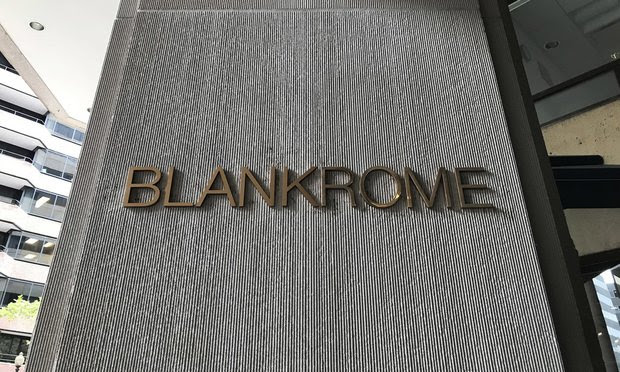
Notable Moves & More
• Blank Rome has again strengthened its white-collar defense practice, adding William "Bill" Lawler, the co-head of Vinson & Elkins' government investigations and white-collar practice group, as a partner in Washington. Earlier this month, the firm hired former federal prosecutor Paul Tzur as a partner in Chicago in the same practice group.
 • Two white-collar defense partners at Pierce Bainbridge Beck Price & Hecht who have been representing Rudy Giuliani on Ukraine-related investigations are planning to leave the firm for Armstrong Teasdale, my colleague Jack Newsham reports. Eric Creizman and Melissa Madrigal (at left) joined Pierce Bainbridge in August 2018 from Creizman's small white-collar defense practice. "I like my people at Pierce Bainbridge, but I'm moving on to Armstrong Teasdale," Creizman said. "It's the right platform. It's got a very strong white-collar and national presence."
• Two white-collar defense partners at Pierce Bainbridge Beck Price & Hecht who have been representing Rudy Giuliani on Ukraine-related investigations are planning to leave the firm for Armstrong Teasdale, my colleague Jack Newsham reports. Eric Creizman and Melissa Madrigal (at left) joined Pierce Bainbridge in August 2018 from Creizman's small white-collar defense practice. "I like my people at Pierce Bainbridge, but I'm moving on to Armstrong Teasdale," Creizman said. "It's the right platform. It's got a very strong white-collar and national presence."
• Debevoise & Plimpton said its New York office has hired Davis Polk & Wardwell partner and Justice Department alumnus Avi Gesser, who helps companies manage their data and prepare for and respond to cyber attacks and other crises.
This content has been archived. It is available through our partners, LexisNexis® and Bloomberg Law.
To view this content, please continue to their sites.
Not a Lexis Subscriber?
Subscribe Now
Not a Bloomberg Law Subscriber?
Subscribe Now
NOT FOR REPRINT
© 2025 ALM Global, LLC, All Rights Reserved. Request academic re-use from www.copyright.com. All other uses, submit a request to [email protected]. For more information visit Asset & Logo Licensing.
You Might Like
View All
Compliance Hot Spots: GOP Eyes ESG as an Antitrust Issue + Another DOJ Crypto Seizure + Sidley Partner Jumps to Main Justice
9 minute read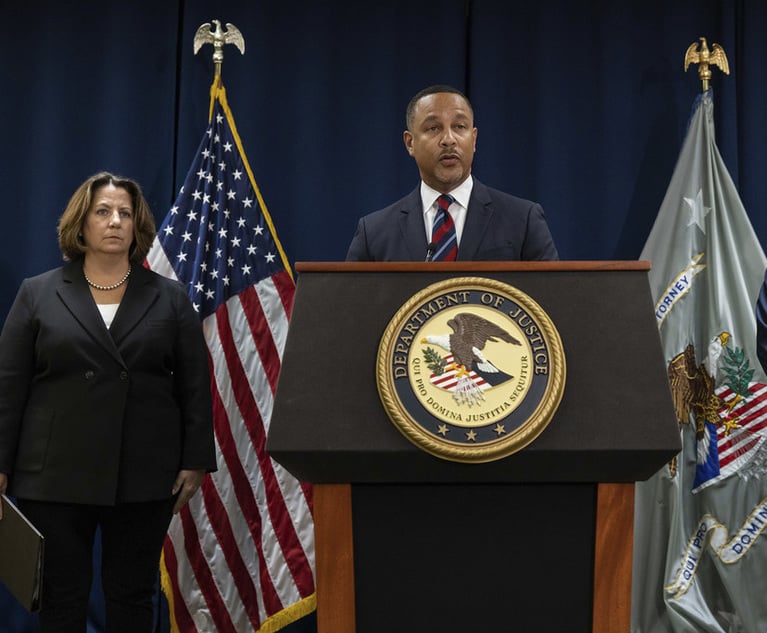
Compliance Hot Spots: Lessons from Lafarge + Fraud Section Chief Talks Compliance + Cravath Lands FTC Commissioner
11 minute readLaw Firms Mentioned
Trending Stories
- 1ACC CLO Survey Waves Warning Flags for Boards
- 2States Accuse Trump of Thwarting Court's Funding Restoration Order
- 3Microsoft Becomes Latest Tech Company to Face Claims of Stealing Marketing Commissions From Influencers
- 4Coral Gables Attorney Busted for Stalking Lawyer
- 5Trump's DOJ Delays Releasing Jan. 6 FBI Agents List Under Consent Order
Who Got The Work
J. Brugh Lower of Gibbons has entered an appearance for industrial equipment supplier Devco Corporation in a pending trademark infringement lawsuit. The suit, accusing the defendant of selling knock-off Graco products, was filed Dec. 18 in New Jersey District Court by Rivkin Radler on behalf of Graco Inc. and Graco Minnesota. The case, assigned to U.S. District Judge Zahid N. Quraishi, is 3:24-cv-11294, Graco Inc. et al v. Devco Corporation.
Who Got The Work
Rebecca Maller-Stein and Kent A. Yalowitz of Arnold & Porter Kaye Scholer have entered their appearances for Hanaco Venture Capital and its executives, Lior Prosor and David Frankel, in a pending securities lawsuit. The action, filed on Dec. 24 in New York Southern District Court by Zell, Aron & Co. on behalf of Goldeneye Advisors, accuses the defendants of negligently and fraudulently managing the plaintiff's $1 million investment. The case, assigned to U.S. District Judge Vernon S. Broderick, is 1:24-cv-09918, Goldeneye Advisors, LLC v. Hanaco Venture Capital, Ltd. et al.
Who Got The Work
Attorneys from A&O Shearman has stepped in as defense counsel for Toronto-Dominion Bank and other defendants in a pending securities class action. The suit, filed Dec. 11 in New York Southern District Court by Bleichmar Fonti & Auld, accuses the defendants of concealing the bank's 'pervasive' deficiencies in regards to its compliance with the Bank Secrecy Act and the quality of its anti-money laundering controls. The case, assigned to U.S. District Judge Arun Subramanian, is 1:24-cv-09445, Gonzalez v. The Toronto-Dominion Bank et al.
Who Got The Work
Crown Castle International, a Pennsylvania company providing shared communications infrastructure, has turned to Luke D. Wolf of Gordon Rees Scully Mansukhani to fend off a pending breach-of-contract lawsuit. The court action, filed Nov. 25 in Michigan Eastern District Court by Hooper Hathaway PC on behalf of The Town Residences LLC, accuses Crown Castle of failing to transfer approximately $30,000 in utility payments from T-Mobile in breach of a roof-top lease and assignment agreement. The case, assigned to U.S. District Judge Susan K. Declercq, is 2:24-cv-13131, The Town Residences LLC v. T-Mobile US, Inc. et al.
Who Got The Work
Wilfred P. Coronato and Daniel M. Schwartz of McCarter & English have stepped in as defense counsel to Electrolux Home Products Inc. in a pending product liability lawsuit. The court action, filed Nov. 26 in New York Eastern District Court by Poulos Lopiccolo PC and Nagel Rice LLP on behalf of David Stern, alleges that the defendant's refrigerators’ drawers and shelving repeatedly break and fall apart within months after purchase. The case, assigned to U.S. District Judge Joan M. Azrack, is 2:24-cv-08204, Stern v. Electrolux Home Products, Inc.
Featured Firms
Law Offices of Gary Martin Hays & Associates, P.C.
(470) 294-1674
Law Offices of Mark E. Salomone
(857) 444-6468
Smith & Hassler
(713) 739-1250




